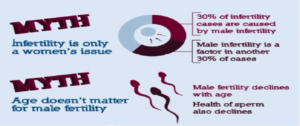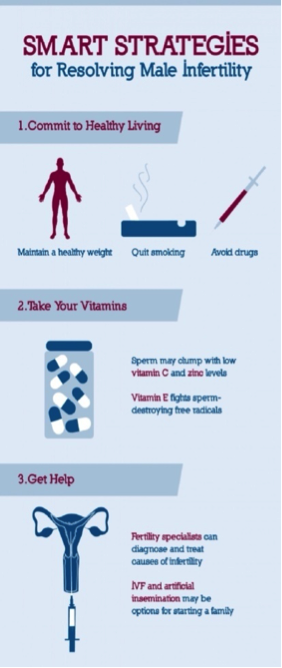Male Infertility

Baby is a divine gift from GOD to mankind to be equally enjoyed both by a man &woman. Approximately 15 percent of couples are infertile. This means they aren’t able to conceive a child even though they’ve had frequent, unprotected sexual intercourse for a year or longer. In about half of these couples, male infertility plays a role.
Before it was believed that female is solely responsible as because male are not screened properly. But now the modern treatment has opened a new door for male.
When to see a doctor
- Are unable to conceive a child after a year of regular, unprotected sexual intercourse.
- Have erection or ejaculation problems, low sex drive, or other problems with sexual function.
- Have pain, discomfort, a lump or swelling in the testicle area.
- Have a history of testicle, prostate, or sexual problems.
- Have had groin, testicle, penis or scrotum.

Risk factors for male infertility include:
- Varicocele, an enlarged varicose vein in the spermatic cord that connects to the testicle.
- Aging, which can reduce sperm counts and motility and decrease the genetic quality of sperm.
- Sexually transmitted diseases, which can cause scarring in the male reproductive system or impair sperm function.
- Lifestyle factors such as smoking and substance abuse.
- Long-term or intensive exposure to certain types of chemicals, toxins.
Diagnosing male infertility problems usually involves:
General physical examination and medical history- This includes examining your genitals and questions about any inherited conditions, chronic health problems, illnesses, injuries or surgeries that could affect fertility. Your doctor may also ask about your sexual habits and about your sexual development during puberty.
Semen analysis- It is usually performed by a fertility specialist, is used to examine the entire ejaculate, because seminal fluid can affect sperm function and movement. Generally, three semen samples are taken at different times to account for variables such as temperature and error. Most specialists prefer three samples that differ no more than 20% from one another before proceeding with diagnosis.
More than 90% of male infertility cases are due to low sperm counts, poor sperm quality, or both. The remaining cases of male infertility can be caused by a range of conditions including anatomical problems, hormonal imbalances, and genetic defects.
Your doctor may recommend additional tests to help identify the cause of your infertility. These can include:
- Scrotal ultrasound
- Transrectal ultrasound
- Hormone testing – Hormones produced by the pituitary, hypothalamus and testicles play a key role in sexual development and sperm production.
- Post-ejaculation urinalysis – Sperm in your urine can indicate your sperm are traveling backward into the bladder instead of out your penis during ejaculation .
- Genetic tests – When sperm concentration is extremely low, genetic causes could be involved. A blood test can reveal whether there are subtle changes in the Y chromosome — signs of a genetic abnormality. Genetic testing may also be ordered to diagnose various congenital or inherited syndromes.
- Testicular biopsy
- Other testing – In some cases, other blood or semen tests may be recommended to try to determine why the sperm may not be able to effectively fertilize the egg.
- Specialized sperm function tests.

Treatments for male infertility include:
Surgery – For example, a varicocele can often be surgically corrected or an obstructed vas deferens repaired. Vasectomy can often be reversed. In cases where no sperm are present in the ejaculate, sperm may often be retrieved directly from the testicles or epididymis using sperm retrieval techniques.
Treating infections – Antibiotic treatment may cure an infection of the reproductive tract, but doesn’t always restore fertility.
Treatments for sexual intercourse problems – Medication or counseling can help improve fertility in conditions such as erectile dysfunction or premature ejaculation.
Hormone treatments and medications – Your doctor may recommend hormone replacement or medications in cases where infertility.
Assisted Reproductive Technology – If fertility issues remain unresolved, intrauterine insemination (also called artificial insemination) and assisted reproductive technologies such as in vitro fertilization should be considered. Intracytoplasmic sperm injection is commonly used in combination with in vitro fertilization in cases of male factor. The couple can also discuss with a fertility specialist other options.
Other tips for helping fertility include:
- Avoid cigarettes and any drugs that may affect sperm count or reduce sexual function.
- Overweight men should try to reduce their weight as obesity may be associated with infertility.
- Get sufficient rest, and exercise moderately but regularly. (Excessive exercise can impair fertility.)
- In metro life stress is obvious. Stress may contribute to reduced sperm quality. It is not known if stress reduction techniques can improve fertility, but they may help couples endure the difficult processes involved in fertility treatments.
- Although studies indicate that tight underwear and pants pose no threat to male fertility, there is no harm in wearing looser clothing.
- To prevent overheating of the testes, men should avoid hot baths, showers, and steam rooms.
- Avoid use of sexual lubricants (Astroglide, KY-jelly) as they may affect sperm motility.

About Author:
Dr. Swarno Rekha Kazi
General Practitioner
